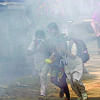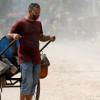One of the most talked-about topics on social media right now is the filthy, hazy, air pollution in Dhaka. With winter officially here, it is no secret that the bustling city's air quality has been "unhealthy," "very unhealthy," and "hazardous" on some days, according to the Air Quality Index (AQI).
Indeed, numerous sources convey that a state of health emergency should be proclaimed if the air pollution levels persist at "hazardous" levels for a minimum of three hours for three days in a row. And yet, we have never seen officials in Dhaka issue such a warning before because "that's how it's always been."
A few hours before passing away on 10 December, 30-year-old Sidrat Jabeen expressed her concerns about Dhaka's air pollution on Facebook. There was extremely polluted air of AQI 253 in the city that day when she passed away.
The World Bank reported 78,145 - 88,229 fatalities in Bangladesh from air pollution in 2019. Another research found that pollution shortens Bangladeshi life expectancy by 6.8 years. Unfortunately, hundreds of complaints and a fatality were required to bring the issue to light.
Posts went around saying that the air quality in our city has become so bad that going outdoors is now like smoking 22 cigarettes per day. Surprisingly, however, the streets of Dhaka reveal an opposite tale to the widespread indignation on social media.
Vehicle pollution has unquestionably not decreased, and people are walking about with almost no masks in sight. Global panic would ensue if the Air Quality Index rose beyond 200-250 in any other region. But, people in Dhaka are going about their daily lives as usual.
Many also expressed frustrations by the Ministry of Environment's advice to wear masks and stay indoors unless necessary, which may not be feasible for those who work every day to feed their families.
So, should the air pollution concern be only limited to social media and not in the streets of Dhaka because that is how it has always been? Are there any other measures you can take to save yourself and your loved ones from this disastrous phenomenon?
Even though air pollution is staring us in the face, we tend to overlook the subtle ways in which we might be contributing to the problem as well. The capital's air pollution problem has persisted for decades, and it cannot get away unless we take steps to reduce it and safeguard ourselves.
Start with lowering your home's energy use. Air pollution is a by-product of power generation and other energy-related activities. Therefore, you may aid in better air quality, reduce emissions of greenhouse gases, and promote energy independence by decreasing energy use.
Please consider walking, biking, or carpooling if you have a vehicle and are going a short distance. You could also combine trips with co-workers or friends, and take the metro or something else instead of driving your car. You will be able to share expenses and save money on fuel, while also contributing to a significant decrease in carbon emissions.
There is also a plethora of air quality monitoring tools, some of which are even free, so it is crucial to be educated and keep an eye on things. Use specialised air quality maps, applications, and filters to stay aware of the situation and make educated choices.
Because it is winter, taking a shower may seem like an unnecessary hassle. It is essential, nevertheless, to wash off any outside germs or pollutants with a shower or bath. If there are any harmful substances on your hair or skin, this will help eliminate them.
Plants that filter the air, such as peace lilies, spider plants, and snake plants, may help improve the air quality inside your home or workplace, mitigating some of the impacts of polluted outside air. According to Environmental Science and Pollution Research, they absorb air pollutants and enhance oxygen.
Additionally, antioxidants and anti-inflammatories in meals may minimise air pollution's health risks. The immune system and the lungs are both helped by vitamin C's potent antioxidant properties, according to the Journal of Nutrients. Vitamin C-rich foods include berries, citrus fruits, and leafy greens. Fish like salmon and food like walnuts and flaxseeds provide omega-3 fatty acids, which decrease inflammation and promote lung function.
And, naturally, masks. We are aware of it, yet nobody pays attention to it. Regrettably, not every mask offers sufficient defence against air pollution. Some masks, including cloth or dust masks, may not be able to capture very tiny particles. On days when the AQI is high, it may be helpful to wear a well-fitting N95 or KN95 mask due to its superior filtration capabilities. These can be found in online and physical pharmacies around the city.
Having said that, these measures might slow down Dhaka's air pollution to a snail's pace. In order to prevent any more serious fatalities, it is imperative that the authorities immediately implement environmental regulations for polluting individuals and organizations, while simultaneously removing all outdated automobiles from the roadways.
When those actions are added to our individual efforts, there might be some hope of restoring the air quality of Dhaka.












Comments